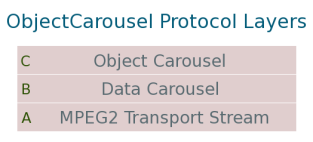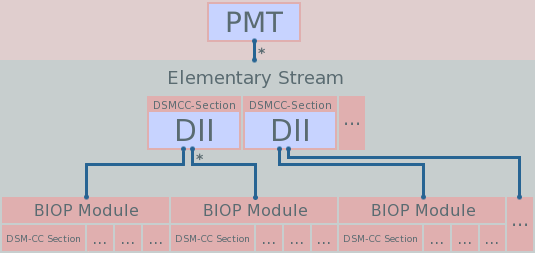DSM-CC Object Carousel Protocol: Difference between revisions
No edit summary |
No edit summary |
||
| Line 15: | Line 15: | ||
For example, given a stream location on dvb://ONID.TSID.SID, you have tune to this service and check some (P)SI tables |
For example, given a stream location on dvb://ONID.TSID.SID, you have tune to this service and check some (P)SI tables |
||
for presence of an ObjectCarousel there (which tables is the subject of the next layer). |
for presence of an ObjectCarousel there (which tables is the subject of the next layer). |
||
As you can see, an ObjectCarousel '''can''' be distributed over multiple PIDs, and there is nothing more special |
|||
to say about the MPEG2 layer of the ObjectCarousel protocol. TS-Packets are merged into DSMCC-Sections as usual, |
|||
and DSMCC-Sections also follow the usual PrivateSection format. |
|||
== '''B.''' Data Carousel == |
== '''B.''' Data Carousel == |
||
Revision as of 19:01, 2 October 2004
The DSM-CC ObjectCarousel protocol is a broadcast protocol on top of MPEG2. It is used for transmission of filesystem hierarchies over a MPEG2 channel.
Like other protocols (NFS, SAMBA etc. via IP), the ObjectCarousel protocol allows mounting of external filesystems that are broadcast within a MPEG2 program.
A. MPEG2 Transport Stream
Basically, to mount an ObjectCarousel, of course you have to know where to find it.
For example, given a stream location on dvb://ONID.TSID.SID, you have tune to this service and check some (P)SI tables for presence of an ObjectCarousel there (which tables is the subject of the next layer).
As you can see, an ObjectCarousel can be distributed over multiple PIDs, and there is nothing more special to say about the MPEG2 layer of the ObjectCarousel protocol. TS-Packets are merged into DSMCC-Sections as usual, and DSMCC-Sections also follow the usual PrivateSection format.
B. Data Carousel
C. Object Carousel
WIP


